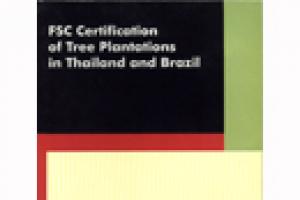The Center for International Forestry Research has implemented a program called Adaptive Collaborative Management of Forests (ACM) for more than five years. At its most extensive, we worked in 11 countries (Nepal, Indonesia, Philippines, Kyrgyzstan, Malawi, Cameroon, Zimbabwe, Ghana, Madagascar, Bolivia and Brazil); and activities continue in eight. One of the striking elements of this work has been our success at involving women (and other marginalized groups) in our work with communities.
Brazil
Bulletin articles
13 December 2003
The Plantar forestry company located in the State of Minas Gerais has large eucalyptus plantations in the zone, established at the expense of evicting the local populations. They were also established at the expense of the typical forest in the zone (the “cerrado”), and the trees were converted into charcoal to supply the iron and steel industry and replaced by eucalyptus, planted for the same objective.
Other information
19 August 2003
The Greater Amazonia that stretches over approximately 7,8854,331 km2 (*) possesses the largest rainforest in the world, with flora and fauna that constitute, on their own, over half the world’s biota, comprising hundreds of thousands of plants and millions of animals, many still unknown to western science. At the same time, its waters represent between 15 and 20% of the planet’s total fresh water reserves, and the great River Amazon alone empties 15.5% of the non-salt water into the Atlantic Ocean.
Publications
8 August 2003
By the World Rainforest Movement
Concern over the spread of tree monocultures and their certification is at the centre of this book. However, this concern is merely one part of much broader concerns concerning forests, forest peoples’ livelihoods and communities of living things.
Other information
31 July 2003
What's wrong with a company pursuing a green seal for 'sustainable forest management' and a climate-friendly credit for planting trees that help soak up carbon from the atmosphere? Potentially a lot, especially when both of these claims are rather dubious, as the WRM Bulletin coverage on the Brazilian company Plantar S/A indicates. And even more problematic if a company, when faced with criticism about its carbon sinks project, resorts to such tactics as the distortion of facts to discredit its critics.
Bulletin articles
3 May 2003
In Minas Gerais during the last week-end in March, more precisely during the night of Friday 28 a deposit for chemical products belonging to the paper mill "Industria Cataguazes" collapsed. The mill, close to the city of Cataguazes, is located on the Pomba river, where millions of litres of caustic soda, chlorine and other toxic products used in making paper leaked out.
Bulletin articles
3 May 2003
In spite of the fact that it is one of the country's most wretched zones, the Valley of Jequitinhonha in Minas Gerais has been the main and paradigmatic goal of the "citizen caravans" of the candidate Lula --in more than one of his presidential campaigns-- and one of the zones chosen to play the new government's strong card --the Hunger Zero plan-- it is odd to note that nothing has been said about the concrete reason (in addition to generic reasons due to socio-economic and perhaps political underdevelopment) that has led this part of the territory of Minas Gerais to such a degraded and ec
Bulletin articles
3 May 2003
A letter with over 50 signatures from Brazilian NGOs, churches, movements and trade unions was sent to investors of the World Bank's Prototype Carbon Fund (PCF) on 26 March 2003, urging them not to buy carbon credits from the controversial Plantar project in Minas Gerais, Brazil. The letter (available at www.sinkswatch.org, also see WRM Bulletin 65) states that Plantar is neither clean nor sustainable development, that the company has continuously violated labour laws, and does not possess an EIA, though required according to the law.
Bulletin articles
4 March 2003
In a letter sent to President Lula on 20 March, numerous institutions warn on possible socio-environmental risks involved in increasing the area of tree plantations recently demanded by the sector, unless appropriate planning is established.
Bulletin articles
15 February 2003
The World Social Forum surpassed all expectations. Fifty thousand people were expected and some 100,000 attended. Participation in the numerous activities organised in Porto Alegre was very active and we all came out strengthened in our endeavour to work for "another world is possible," as announced by the Forum.
Bulletin articles
11 February 2003
In the framework of the World Social Forum, representatives of Latin American NGOs got together to discuss the possibility of coordinating efforts with respect to the growing problem of tree monocultures.
During this meeting, the factors promoting territorial occupation by monocultures aimed at timber, cellulose fibre and palm oil production were analysed, together with factors limiting this occupation.
Bulletin articles
11 February 2003
Presented as a "clean" source of energy that does not contaminate the atmosphere with greenhouse gases, as in the case of oil or natural gas, obtaining hydroelectric energy by building dams continues to advance along the Xingu river, the last of the great Amazon rivers in good state of conservation.

